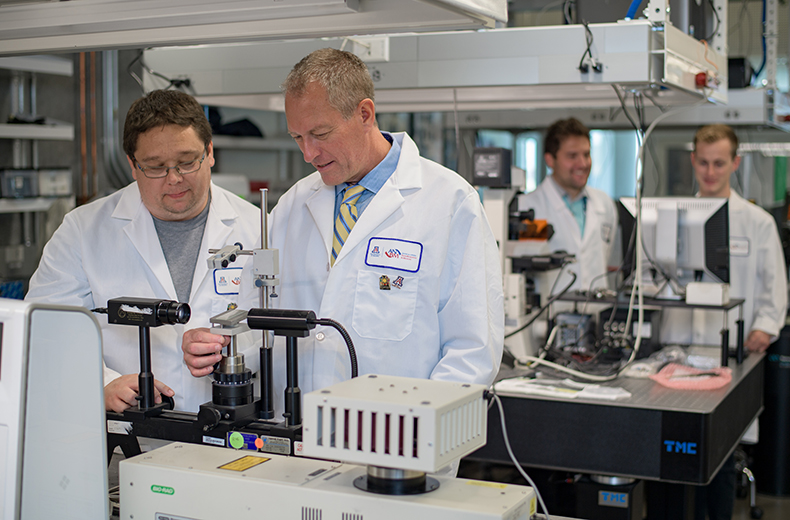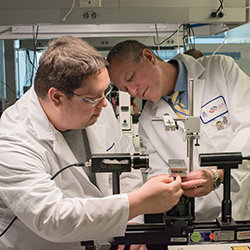
Researcher's Work Enables Simpler, More Efficient Detection of Radiation Exposure Risk

Frederic Zenhausern, PhD, MBA, professor and director of the Center for Applied Nanobioscience and Medicine at the University of Arizona College of Medicine – Phoenix, has done pioneering work in microfluidics, genetics and DNA forensics with the first demonstration of the automated and microfluidic miniaturization on-chip of the entire process for rapid DNA Short Tandem Repeat (STR) genetic analysis for human identification.
His work in rapid DNA analysis was implemented by the FBI, the UK Forensic Science Services and police forces of the United Kingdom, the Netherlands, Germany and Austria. The mobility at the point of care and the acceleration of the analytical turnaround time from days to less than one hour provided a significant reduction in the processing backlog of sexual assault cases. Now, under the Rapid DNA Act legislation, this technology is an effective tool for law enforcement, but also promising for point-of-care diagnostics in clinical settings.
He owns more than 20 U.S. patents for DNA sequencing, organ-on-chip and genomic analysis and was active in technology licensing with industry. In addition to point-of-care diagnostic instrumentation and biosensors for protection against chemical, biological, radiological and nuclear threats, Dr. Zenhausern’s discoveries also include high-resolution microscopy, near-field optics and spectroscopy.
Dr. Zenhausern discussed his latest work.
Explain Your Research

This is the next step in the evolution of this technology toward use on a test flight in space. The “vertical flow” device, a novel technology patented and licensed by Tech Launch Arizona, is being used as an easy way to test astronauts’ health in space.
In the Center’s first NASA grant, the chemistry of the device was tested for protein markers. Its application to nucleic acid detection was demonstrated under a second NASA Human Research Program grant, led by Center researcher Jerome Lacombe, PhD, an assistant professor in the medical school’s Basic Medical Sciences Department.
The latest grant — $100,000 from NASA and its Translational Research Institute for Space Health — will pursue with Space Tango, a private aerospace company that designs, builds and operates facilities on the International Space Station, development of the diagnostic test using a human factor engineering approach to validate its performance in microgravity.
Center researcher Jian Gu, PhD, an associate professor in the college’s Basic Medical Sciences Department, will work with the Kentucky-based company to integrate the diagnostic platform into Space Tango’s automated hardware.
Why is This Important?
What is exciting is that NASA is investing more funds in space exploration and is considering human health as its first priority to succeed in long-duration missions. Until now, very little monitoring of the health of astronauts has occurred, but deep space travel will require cutting-edge technologies for astronaut health and performance.”
What is Your Motivation for This Next-Generation Immunoassay Technology?
I often go biking in the mountains near my home in Fountain Hills, Arizona. Being alone in remote areas made me realize that time is of the utmost importance during a medical emergency or exposure to a biological threat in remote settings. Having access to robust, simple, low-cost biomedical platform technologies compatible with modern communication systems such as smartphones, offers a sense of protection and lifestyle management to prioritize health and ultimately improve quality of life.
Why Now?
There is a need for disruptive innovation in health care delivery. This technology allows for more mobile access to care, earlier disease detection and advances personalized and precision diagnostics and treatments.
About the College
Founded in 2007, the University of Arizona College of Medicine – Phoenix inspires and trains exemplary physicians, scientists and leaders to advance its core missions in education, research, clinical care and service to communities across Arizona. The college’s strength lies in our collaborations and partnerships with clinical affiliates, community organizations and industry sponsors. With our primary affiliate, Banner Health, we are recognized as the premier academic medical center in Phoenix. As an anchor institution of the Phoenix Bioscience Core, the college is home to signature research programs in neurosciences, cardiopulmonary diseases, immunology, informatics and metabolism. These focus areas uniquely position us to drive biomedical research and bolster economic development in the region.
As an urban institution with strong roots in rural and tribal health, the college has graduated more than 1,000 physicians and matriculates 130 students each year. Greater than 60% of matriculating students are from Arizona and many continue training at our GME sponsored residency programs, ultimately pursuing local academic and community-based opportunities. While our traditional four-year program continues to thrive, we will launch our recently approved accelerated three-year medical student curriculum with exclusive focus on primary care. This program is designed to further enhance workforce retention needs across Arizona.
The college has embarked on our strategic plan for 2025 to 2030. Learn more.